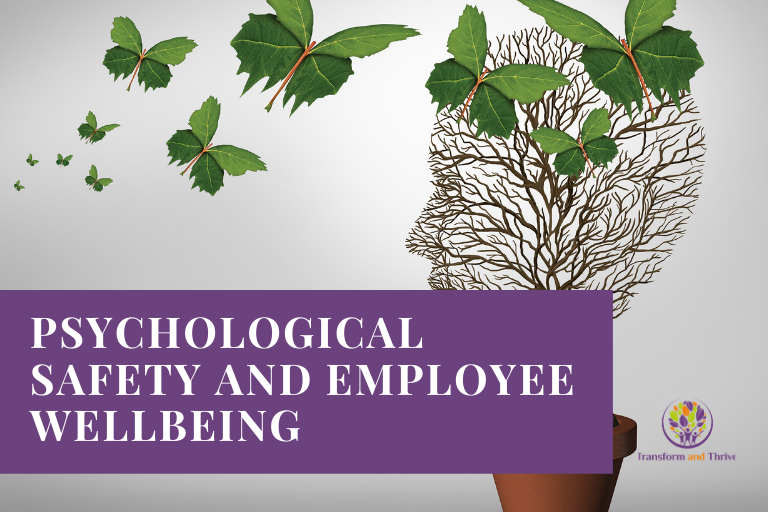Psychological safety and employee wellbeing
Many years ago, I heard employee wellbeing described as the ‘slow accident’ by a health and safety leader in my workplace. I thought this was such a powerfully accurate description.
After all, when we consider health and safety, we generally think about the obvious trips, slips and falls in the workplace; those immediately obvious hazards that cause accidents.
Employee wellbeing is often more intangible than traditional health and safety. The personal and business outcomes often take longer to witness. A poorly designed job role, an ill-equipped manager, unrealistic workloads, a blame culture; these things can take months or years to manifest as poor employee wellbeing.
This week I’m starting a new wellbeing consultancy engagement with my care sector client.
I’ve been thinking about all the risks and opportunities that show up when a project like this gets underway.
Psychological safety is a necessary foundation for your wellbeing strategy
One area of consideration is psychological safety. Without this, no amount of effort and resource in creating a meaningful wellbeing approach for your people, will deliver the wellbeing impact you seek.
What is psychological safety and why does it matter for employee wellbeing?
Psychological safety is a straightforward concept that risks being lost in the depths of management speak unless we bring it to life. Thankfully, the hard work of researching and writing about it has already been done by the likes of Amy Edmondson and Timothy R Clarke.
Psychological safety is
“A shared belief held by members of a team, that the team is safe for interpersonal risk-taking
(Edmondson, 1999)
It is the serendipity when you work with people, around whom you can be yourself. You can let go of the idea of a work persona and a home persona. You can speak about your dreams, aspirations, challenges and fears in the workplace knowing, being absolutely confident, that you will not suffer negative consequences as a result. You will not be passed over for promotion because you have shared something challenging or personal to you. You will not be judged or blamed if you try a new idea and don’t succeed. You can have healthy, productive discussions with people at all levels in the business even when you don’t agree.
Psychological safety is often erroneously thought of as simply being about maintaining confidentiality, or about enabling moaning or dissent in the business. I often hear skepticism about psychological safety because some people feel it gives permission for poor behaviour or low performance gets ignored or remains unacknowledged. Edmondson and Clarke are crystal clear about this; psychological safety means that everyone in the business is just as empowered to speak up when performance falls below standard, as they are when performance peaks and needs to be celebrated. Both are discussed, examined objectively and the lessons learnt and applied. Egos can be dropped.
How does this relate to employee wellbeing?
In the 20 or more years that I have been involved in employee wellbeing, I have been struck by the passion and enthusiasm shown by stakeholders about the wellbeing of employees. It is wonderful that more organisations feel able to address employee wellbeing as a strategic priority.
However, the sticky moments start when we consider:
- why wellbeing measures are not being recorded
- why employees stop engaging in programmes
- Why employees neglect to share their thoughts and feelings about how work impacts their personal wellbeing and performance.
Creating a culture of wellbeing in your business is inextricably linked to your entire organisational culture. They are not separate entities.
Do you have a culture of psychological safety that supports wellbeing?
- How do you speak to each other in the business?
- How do people behave with each other?
- Are mistakes okay?
- How do you celebrate progress and innovation?
- Where do new ideas get showcased and discussed?
- Are employees able to speak up about their experiences in and out of work, with complete transparency and non-judgement?
- If I was your employee and I told you I have a diagnosis or lived experience of depression, could I be 100% sure this wouldn’t negatively impact my aspirations to lead the team?
- If your employees have a wonderful idea about what would boost the wellbeing of their team this year, could they openly share that, even though it is a bit left field and your business has never considered anything like that before?
Teams perform well when they feel energetic and well. Teams are innovative and engaged when they are working in an environment of ease and equality. Psychological safety is critical to the wellbeing of your employees.

